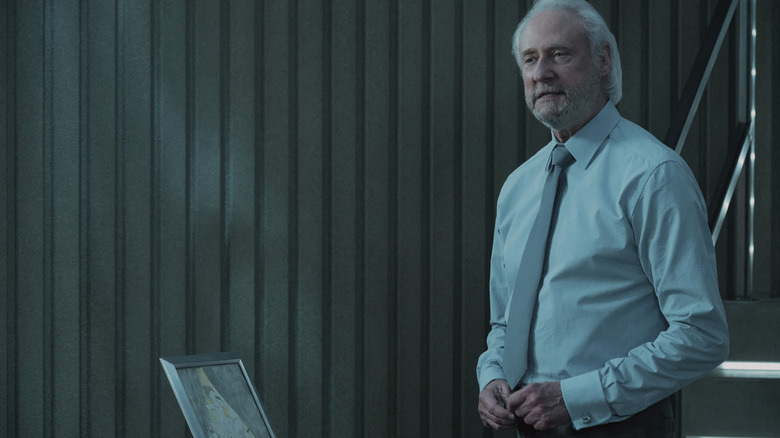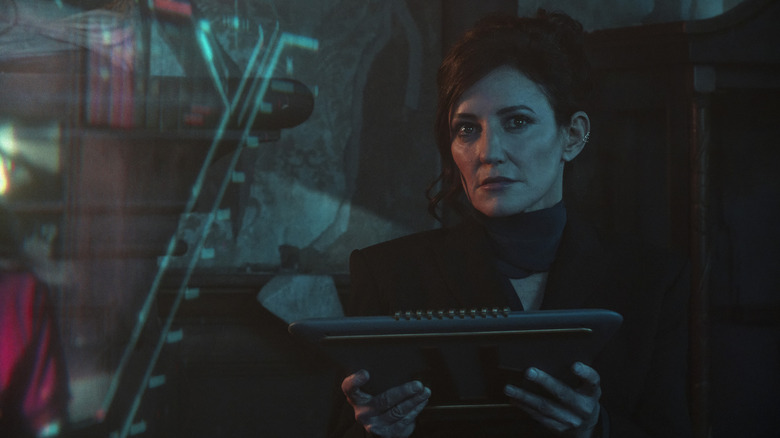The (Dumb) Mystery Is Afoot In Episode 5 Of Star Trek: Picard
Over the weekend, I revisited the "Star Trek: The Next Generation" episode "The Measure of a Man" from 1988. In it, Data (Brent Spiner), an android, was put on trial to determine his sentience. Was Data alive and conscious, or was he merely running elaborate programs to emulate human behavior? Is he autonomous, or the property of Starfleet? The center of the episode is a conversation between Capt. Picard (Patrick Stewart) and Guinan (Whoopi Goldberg) about what it would mean for the Federation at large if Data was considered property. Guinan mentions that, historically, many cultures have operated with an exploited class of "disposable people." Picard realizes she's talking about slavery.
It's an episode about the nature of consciousness, the insidiousness of the legal system, and attitudes that have led to slavery. I would call it one of the best episodes of the show.
Watching "Star Trek: Picard" offers quite a different experience. "Picard" is a show devoted to story and action — it focuses on mystery and peril and violence — leaving viewers with little to hold onto thematically. Indeed, the most disappointing aspect of most of the newer "Star Trek" shows is that they are devoted more to scenarios than to ideas. Very occasionally a show like "Picard" may pay lip service to Gene Roddenberry's notions of an idealized future wherein war and prejudice are behind us, but more often, the writers busy themselves with mayhem.
In terms of theme, the best one might say is that this season of "Picard" — at least so far, we're only halfway through — is that it explores intergenerational legacies. It will be revealed in episode five, called "Fly Me to the Moon," that the catalyst of the future's history is none other than an ancestor of Picard's, a young astronaut named Renee (Penelope Mitchell). Additionally, we will see an ancestor of Dr. Soong, Data's creator (also Spiner), a geneticist who is attempting to alter human genomes. He is attempting to cure a genetic disease in his own daughter (Isa Briones, who played Dahj, Soji, and Sutra in season one of "Picard"). Apart from a limp sense of familial familiarity, there doesn't seem to be too much going on outside of the plot.
The plot
At the end of the previous episode, Picard finally met a mysterious character called the Watcher, who was somehow instrumental in a divergence of the "Star Trek" timeline, currently threatening to tilt into dystopian fascism, as seen in episode two. The Watcher is played by Olra Brady, who also played Picard's Romulan house servant Laris, but the Watcher is, we learn, definitely not Laris. The Watcher spirited Picard away with a mysterious transporter, and, at the start of "Fly Me to the Moon," arrives in ... an ordinary Los Angeles apartment. The mystery of the Watcher's identity was inflated for dramatic purposes, as Picard could have easily knocked on her apartment door. She reveals that she has been hired by an as-yet revealed, even more mysterious entity to watch over Renee Picard, an aspiring astronaut who doubts her ability to carry out her latest training. Picard and the Watcher see via spy-cam footage that Renee's shrink has been discouraging her from carrying out her training. The shrink is none other than Q (John de Lancie). Musical sting.
At the end of episode four, Q had somehow lost his godlike powers and is now — bafflingly — getting his hands dirty, so to speak, in deliberately tainting the timeline and actively creating a fascist world by discouraging Renee (not to be confused with René, Picard's nephew). Q will also have meetings with Dr. Soong, and will aid him in his genetic research by e-mailing him mysterious QR codes. Soong will be granted the secrets of his daughter's genetic disease that prevents her from going outside or breathing unfiltered air.
The following comment may sound like the closed-minded ravings of an aging Trekkie, but this is incredibly out-of-character for Q. Previously, Q was arrogant and confident, able to manipulate reality to his will. He is not a schemer, but a trickster, using playful chaos and a lack of decorum to test and prod the otherwise well-behaved diplomats of the "Star Trek" universe. Here, Q is ... manipulating one woman's therapy and unduly affecting the future of genetic research? Q may function as an antagonist to Picard, but he was rarely an out-and-out villain. The one time Q was caught tormenting lower life forms (in the NextGen episode "Déjà Q"), he was duly punished (he was transformed into a human) and seemingly learned a lesson. Here, Q serves the same plot function as a SMERSH spy would in an early James Bond movie: He's up to no good.
The many Spiners
"Fly Me to the Moon" calls back to a plot from "Star Trek: Enterprise" with Dr. Soong. In a three-part episode of that show, Brent Spiner played Arik Soong, a rogue geneticist who was attempting to improve human the human genome outside the auspices of the law. He longed for human perfection and was testing his genetic tinkering on Klingons (finally explaining, canonically, why the Klingons from the original series looked different from the Klingons in NextGen). At the end of that arc, Soong realized that genetic manipulation was not the way to make an ideal human, turning instead to cybernetics. Data was the end result of generations of ambitious Soongs, each of them played by Spiner. In the NextGen era, Spiner played Data, his brothers Lore and B-4, and Dr. Noonien Soong. In season one of "Picard," he played Soong's son Altan, and now he's playing an ancestor, Adam. Spiner has played seven members of the same family. Two more, and he'll have tied Alec Guinness' record in the 1949 Ealing comedy "Kind Hearts and Coronets."
It's maddening that "Picard" is playing the family card. In twist after Oliver twist, we learn that Picard is the center of all things in the universe; that he is a lynchpin in holding the galaxy together. This is the bread and butter of "Star Wars," wherein most of the protagonists are all eventually revealed to be part of the same family. How disappointing that the ordinarily secular and scientifically-minded "Star Trek" is playing into themes of intergenerational destiny. Not space/time causality, mind you, but something more mythic. Think back to "The Measure of a Man" and its discussion of consciousness and the mindset that leads to slavery. That has become lost in Joseph Campbell's grab bag of monomyths.
Oh yes, and the Borg stuff
Predicting a TV show's plot is only an issue if you're also sharply aware that you are predicting a TV show's plot. The relationship between Dr. Jurati (Alison Pill) and the Borg Queen (Annie Wersching) had evolved into something interesting in "Picard's" first four episodes, as the two were coming to respect one another. This was setting the stage for Jurati needing to eventually defend the evil cyborg from her allies, leading audiences to consider the plight of a villainous entity as a whole citizen with rights of her own.
Sadly, these promises were cut short by a twist wherein the Borg Queen implants Dr. Jurati's brain with Borg nanobots, effectively assimilating her. Dr. Juarti, however, does not take on any Borg qualities, and merely appears to have been brainwashed into being a secret agent for the Borg. In the final "Mission: Impossible"-inspired scenes — wherein our protagonists have reunited and are plotting to infiltrate a fancy-dress ball — leave us wondering where Dr. Jurati's loyalties lie.
This plays into a popular fan theory that the faceless Borg monster seen in the first episode of the season was a time-traveling Dr. Jurati who had been assimilated. I sincerely hope "Picard" subverts those expectations, or they fulfill them in a clever way. As it stands, viewers may have entered into a phase wherein they are waiting for the plot to grind itself out, rather than stay engaged.



